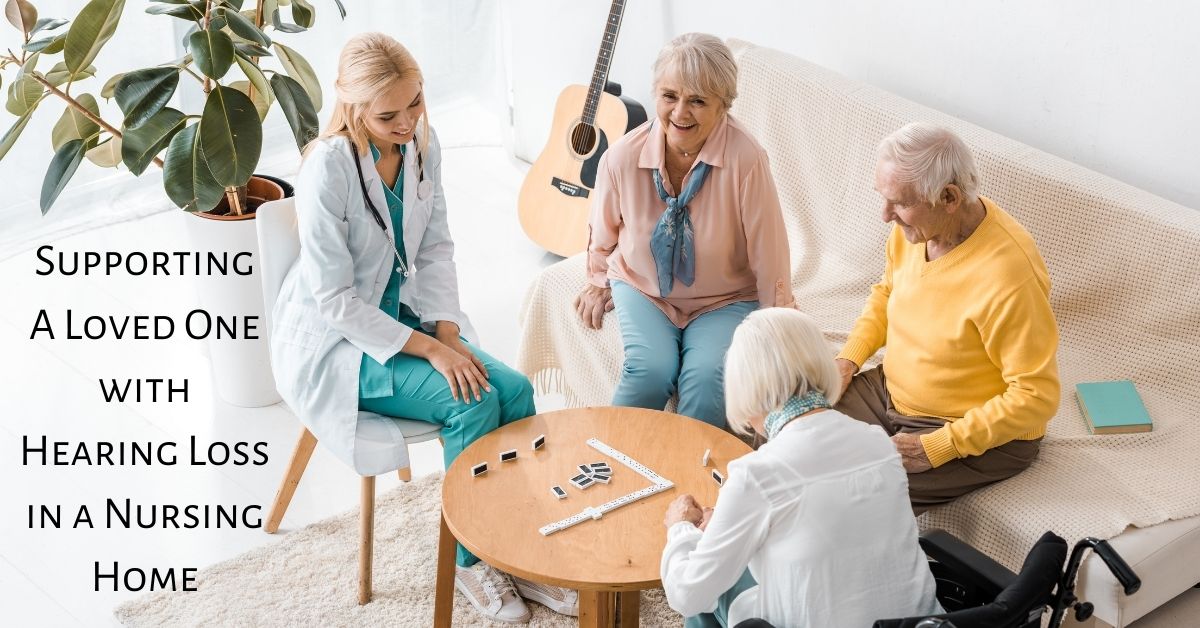As members of our family age they may require full time care that is beyond our capacity due to physical, logistical and even emotional limitations. Placing your senior families in a nursing home allows for them to have the expert medical attention they need, places them among contemporaries and gives you the peace of mind that your beloved family members are cared for. However, if you senior deals with hearing loss, it is up to you to make sure that it is treated.
The Dangers of Hearing Loss for Seniors
Treating hearing loss in seniors can be difficult because many who struggle, do not realize they have a problem at all. This is because hearing loss develops slowly over time making it hard to remember what healthy hearing sounded like in the first place.
Hearing loss in seniors can make it harder for them to participate in conversation. It may seem more tempting for you beloved seniors to avoid social interaction all together. This can lead to social isolation and depression, which can have a serious impact on health.
Studies show that seniors who stay socially active and engaged experience a variety of benefits, including improved cognitive function, better emotional health, enhanced physical health, boosted immune system and increased longevity.
In addition, treating hearing loss in seniors also lessens the risk of falls accidents and hospitalization, due to having more audio information in their surroundings. It’s important to remember that approximately half of all seniors over 75 deal with some degree of hearing loss. Make sure to have the seniors you care for screened for hearing loss and make sure to treat it as soon as possible.
Treating Hearing Loss
While it is important to understand that age-related hearing loss cannot be reversed it can be treated effectively with hearing aids. Hearing aids amplify the sounds, which are hard to hear and send them to the inner ear using electrical waves. The hearing aids you obtain for the seniors you care for in nursing homes should be easy for them to use.
Dexterity issues might make it hard for some seniors to use smaller hearing aids. If they are too complicated often seniors choose to not wear them. Unworn hearing aids are as effective as no hearing aids at all! Communicate with the staff at the nursing facility about the importance of your loved one’s hearing aids. They can help your family members practice care and proper hearing hygiene with their hearing aids.
Keeping Track of Hearing Aids
Hearing aids can be extremely small and are programmed and fitted individually for each person. It is all too common for hearing aids to end up lost, mixed up or broken. Take time to label your family member’s hearing aids to help keep track of them. Some modern hearing aids can even be tracked via smartphone, to aid in finding them if they end up lost.
Keep the Hearing Aids Clean
Hearing aids can perform at their highest capacity when they are kept free of dirt and debris. When dirt and earwax build up the tiny parts can become impacted making sounds that were once clear sound muffled. Keeping your loved one’s hearing aids clean is not something most staff members will have the time to do.
If able, stress the importance to your family member of practicing proper hearing aid maintenance. If this is not in their capacity, taking responsibility for cleaning your beloved senior’s hearing aid weekly will enhance the listening experience. Wiping off the hearing aids with a soft dry cloth and clearing debris out of vents and cracks is quick and keeps hearing aids working better for longer.
Schedule Regular Hearing Exams
Hearing loss is usually progressive meaning that if not properly monitored the hearing aids they are using may not suit them over time. This is why, for your loved one in a nursing home, regular hearing assessments are extremely important.
Seniors who treat their hearing loss have improved mental health, greater physical ability, a richer social life and a higher quality of life in general. Make sure you talk to the staff about the importance of helping your beloved to wear their hearing aid regularly. Most importantly have their hearing checked annually. If you haven’t already, schedule an appointment today so the senior in your life can hear the richness of sound for years to come.

